Getting lost in the other world of Hunterdon County is almost a divine experience. Idyllic farms, narrow roads curving by fast rocky streams, gorgeous residences that seem tucked in a distant land and old movie-set towns blur time and geography. Such was the day I came to walk the Hill and Dale Preserve in Tewksbury, a recent purchase of the New Jersey Conservation Foundation (NJCF), an organization dedicated to saving and protecting New Jersey’s important lands and natural resources for all to enjoy.
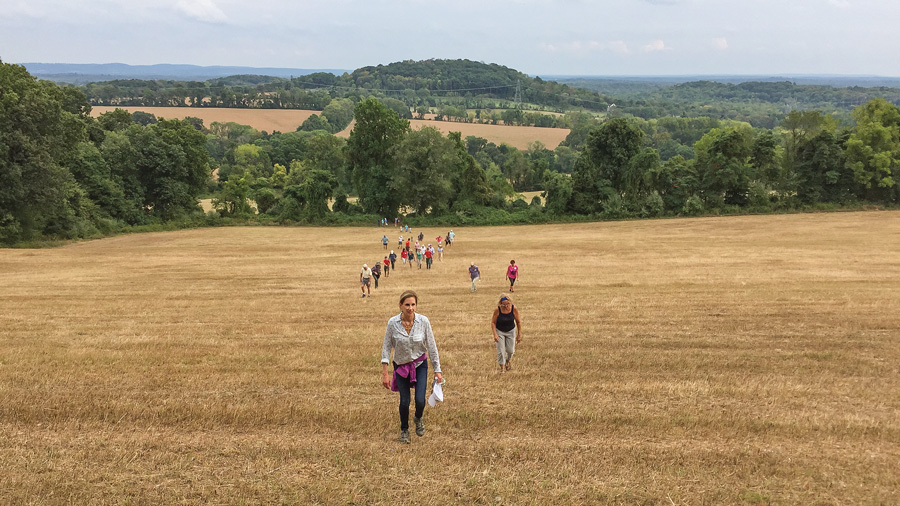
I meet Marie Newell, NJCF project coordinator, at the Hell Mountain parking lot on Parsonage Lot Road in Tewksbury for a walk around the three-hundred-acre Hill and Dale Preserve. We cross the road to a meadow and head uphill on a wide, grassy path. The climb to the top of the highest field is moderately difficult and, out of shape, I stop to catch my breath. The steepness of the path under my feet surprises me—almost like a staircase without risers. Around me, light woods stretch to the road, and fields gone to milkweed and dogbane are on my left. Horses, dogwalkers, hikers and coyotes use the wide farm paths I see. The meadow soon becomes two, then reaches the top where benches built by Eagle Scouts await. Turning around, I am struck by a magnificent view and learn how the preserve, and the farm before it, earned its name. From here to the horizon, the land slides down and up again through meadows, corn and hay fields streaked by hedgerows and patches of trees and, in the distance, the Watchungs and Cushetunk Mountain appear.
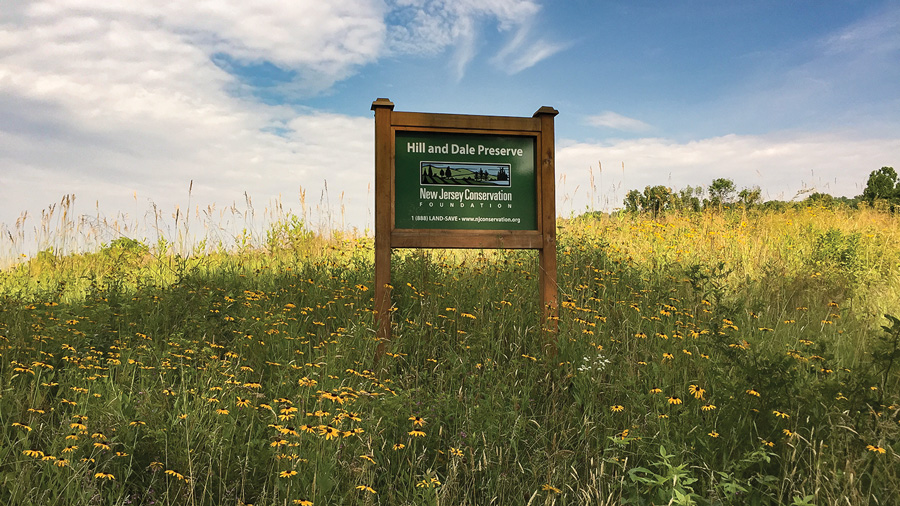
We rest for a moment on the benches, then walk to the next field on an orange-blazed path developed by the equestrian Tewksbury Trail Association which maintains this, along with two other trails with help from the Boy Scouts. Volunteers are treasured by NJCF. They inspect and trim trails, clean up garbage and let the organization know of any issues that need to be addressed. “They’re our eyes and ears,” says Newell. “Local people with different backgrounds volunteer their time, their art and so much more.” Soon the Orange Trail will have signs painted and donated by a local artist. “That’s a really great thing when you get a community involved and take care of the land as if it were their own,” adds recently-retired NJCF Executive Director, Michele Byers.
In its sixty-one years of existence, the New Jersey Conservation Foundation has been instrumental in protecting over 120,000 acres of land in the Garden State. This group of dedicated advocates advises all levels of New Jersey government on environmental policy, raises funds, works with landowners who wish to maintain their dream while preserving their land forever and has organized and partnered with a cadre of like-minded public organizations and private individuals, land trusts and nonprofits (many that they have organized) to acquire and protect lands.
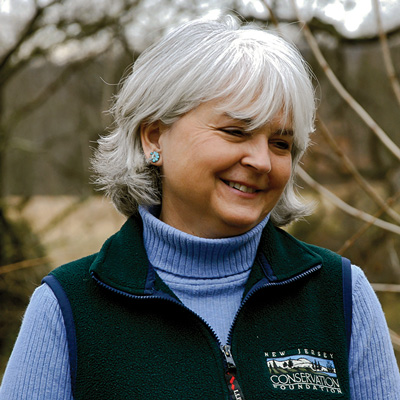
The NJCF may sound like an organization of environmental activists, a description that Byers agrees with. “Oh, yes. We’re most definitely activists and proud of it!” she says. They are known for their dedication, tenacity, a strong commitment to the natural world, wildlife, and clean water and air. “We’re all committed to that. We defend natural lands and habitat, and sometimes we do have to go to court.” They’ve had countless cases, with lots of litigation in their history concerning wetlands, local land use and conservation issues. Take Great Adventure, who wanted to go off the electric grid and create space for new solar panels by cutting down ninety acres of Pine Barrens forest. NJCF tried for four years to convince them to put the panels in their large parking area. Stronger than the theme park’s animals of the jungle, the forest’s defenders finally sued the town and reached a settlement. Great Adventure cut only thirty acres of forest, leaving sixty saved, put the panels in their parking lot, went off the grid and are now powered by solar!
NJCF is involved in a current case against the PennEast pipeline that would deliver natural gas from fracked shale in Pennsylvania across the Delaware and down through Hunterdon and Mercer Counties. A federal court gave PennEast approval to go onto privately-owned and preserved lands to survey wetlands, endangered species and archeology sites, in order to complete an application to the NJ Department of Environmental Protection, who has one year to make a decision. The pipeline would run through thirty-eight Category One streams of the highest quality that support native trout, plus one hundred private and fifty preserved properties that would be seized by eminent domain. “We are challenging the need for a pipeline and the constitutionality of the federal government to give a private company the authority to use eminent domain and take property from private and public lands for a project that has no public need,” says Byers. “It’s going to take a hard backbone on the part of the State to uphold the regulations. If they do uphold the regulations, there’s no way they can approve the application.”
Newell, who is involved with the acquisition of properties and facilitation of their stewardship, admits that complexities abound in the protection of land with various methods to accomplish goals. Flexibility and compromise seem necessary qualities in any aspect of a project. Across Hill and Dale Road, a farmer keeps the Preserve in agriculture, maintaining the hedgerows and mowing the native meadows once a year to keep them herbaceous. Local hunters control deer to save woodland understory. “Here is the best of both worlds. People can experience the land and, still, it produces,” Newell explains. “It will be farmed forever.”
NJCF seeks properties with special natural resources such as Rockaway Creek, a pristine tributary to the Raritan River. This state-designated trout production stream flows buoyantly through the preserve. Watching it sparkle and bounce off rocks takes your mind away from all else. The Foundation also looks for open spaces of farmland and properties adjacent to existing preserves to extend green corridors such as Hill and Dale. Hell Mountain, woodland owned by Tewksbury Township, and a few other small parcels soon to be purchased, will together offer nine hundred contiguous acres of protected land with a ten-mile loop made more user-friendly with a $100,000 Tewksbury Land Trust grant.
Several partners contributed to the purchase of Hill and Dale Preserve, among them Hunterdon County, Tewksbury Township and Green Acres. It’s a large puzzle, Newell says, and is dependent on timing of grants. “We have eight acquisition people and a limited amount of funding. To do a deal we have to be really creative. The stars have to align. We might have a goal but the landowner must need to want to preserve it. We tell them, “If you ever want to protect it, we’re here.’”
Among the ways to preserve land, NJCF employs creative and innovative techniques. One method is by acquiring a conservation easement, Chubb Park in Morris County being the first of 130 around the state. Or a landowner may want to sell development rights. Alternatively, homeowners with a farm or open space who don’t want to leave their home may donate the land but stay in the house until they die or choose to leave. Maria Amalia, widow of Cyril dos Passos, corporate attorney/railroad executive and butterfly collector/naturalist, donated fifteen acres to NJCF while remaining in her house for over forty years until she moved to Portugal. NJCF eventually sold the house and property to the town of Mendham for open space. Often, the Foundation buys the land outright. Although buying and protecting land is usually a collaboration among several organizations and individuals, each entity has its own mission and the best-suited acquires the land. NJCF keeps only those properties that they open to the public. Currently, they own and manage thirty thousand acres of preserved land for all to enjoy hiking, strolling, bicycling, horseback riding, canoeing, birding, picnicking or just sitting on a bench at the top of a hill enjoying the views, sounds, quietness and soul-reaching peace in nature.
In the face of climate change, NJCF is looking statewide. They pose the questions: What are the full range of solutions within natural lands to help mitigate the effects of climate change? What must be done to mitigate against loss of land and loss of wetlands? In the Pine Barrens, salt water intrusion is occurring and impacting wells in South Jersey. The more fresh water pumped up from the underlying aquifer, the more brackish water from the bay replaces it, causing major loss of habitat.
On the policy front, NJCF fosters plans to move New Jersey away from fossil fuels and is working with the Clean Energy Law to increase energy efficiency. They plan to stop more fossil fuel infrastructure such as the PennEast pipeline and a gas-fired power plant compressor station in Kingston. Says Byers: “We can set an example.”
They are looking at the ways that natural lands mitigate within an ecosystem and applying at methods to land management, such as such as wetland and vegetation buffers that slow down flooding and revegetating stream banks, to help deal with climate change. Carbon sequestration is of major importance, so organic farming and no-till methods will be encouraged on their preserves.
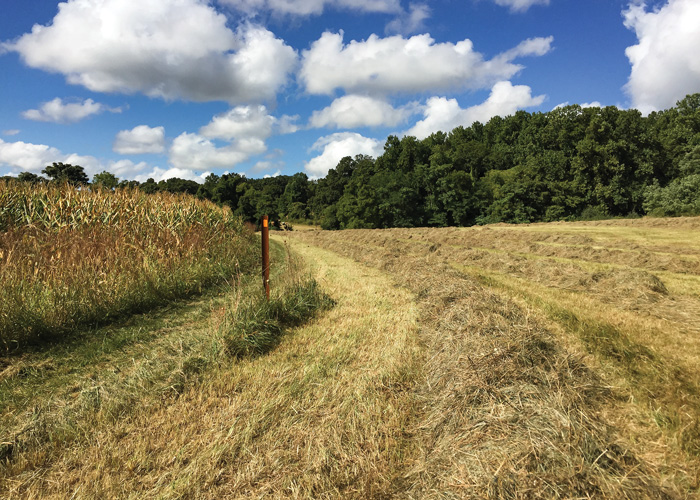
What’s the draw to Hill and Dale Preserve? Besides awesome views, bird-watching, great walks on wide, clean trails and grassy farm roads, an eventual ten-mile loop will traverse other protected lands and the historic town of Oldwick. You can enjoy organized hikes with NJCF staff at the annual New Year’s hike or, in September, the Point-to-Point horse race of the Tewksbury Trail Association with fifty to seventy horses! “Everybody can come here and experience what I’m experiencing,” Newell says. “I love working here. It’s a great group. People here are connected to the greater good. To me that’s inspiring.”
Byers, who served in the top leadership role since 1999, only the third executive director in the organization’s history, retired from her postion in 2021. “My nearly forty years at New Jersey Conservation has been the most rewarding career imaginable,” said Byers, a Bedminster resident. “I’ve always loved nature, animals and the outdoors and this job has been a dream come true. I feel the timing for my departure is good as New Jersey Conservation has a strong staff and board and many significant conservation projects in the works.”
Come listen to the music of Hill & Dale Preserve.
Hill and Dale Preserve, 97-91 Rockaway Rd, Lebanon
For more information about the New Jersey Conservation Foundation, check their website.

Delightful fantasies beyond words! Gold, Platinum & Silver Jewelry, Wildlife Photos, Crystal, Lighthouses. Perfume Bottles, Santas, Witches Balls, Oil Lamps, Paperweights, Chimes, Art Glass, Wishing Stars. Also offering jewelry and watch repair
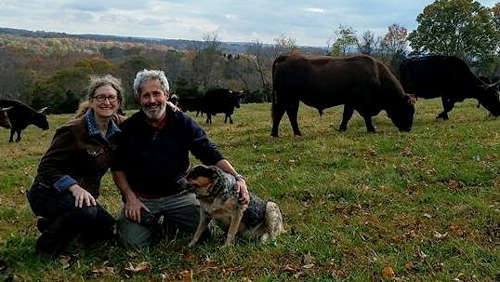
Artisanal cheeses, wood fired breads, 100% grass-fed beef, whey fed pork, and suckled veal, 100% grass-fed ice cream, pasta made with Emmer wheat and our own free-range eggs, and pesto made with our own basil! Bread and cheesemaking workshops are held on the working farm as well as weekend tours and occasional concerts.